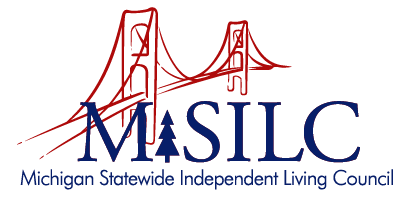When people in Michigan with disabilities or their families need help, there are a number of resources available to them from the State of Michigan. While state resources are invaluable, chances are that they will also turn to nonprofit or community organizations committed to removing barriers and expanding opportunities.
We know all too well how exclusionary public life can be for people with disabilities. While there are widely available accommodations such as parking spaces, restroom stalls, closed captions, places where people who use a wheelchair can sit with their friends at movie theaters and stadiums, society is not generally built to be inclusive and accessible. Whether intentional or not, this can make people with disabilities feel unwelcome, contribute to feelings of isolation, and make it impossible for them to participate fully in society.
The Michigan Statewide Independent Living Council (MiSILC) partners with a number of organizations that provide people with disabilities with engaging activities and opportunities for learning, employment, and recreation. These organizations have staff and volunteers who are knowledgeable, committed, and passionate about making the world a more inclusive place for people with disabilities. Perhaps one of the most notable aspects of these organizations is that they don’t look at people with disabilities through the lens of limitations, they look through the lens of possibility. The question posed to people with disabilities isn’t what can’t you do, but what can you do? What do you want to do? What is the vision for the life you want to lead and how can we as an organization help you fulfill that vision?
That’s where Centers For Independent Living (CILs) come in. CILs are designed for, and usually run by, people with disabilities with the goal to help others live independently with dignity and autonomy. Again, the focus is not on the impossible, it’s on what is possible. CILs are not only community hubs, they are also where people can find a number of resources, from peer support to help finding employment to advocacy to help transitioning into community-based living.
There are 15 CILs in Michigan including Disability Network Michigan (DNM), which runs 12 CILs across the state, Superior Alliance for Independent Living (SAIL), which serves the upper peninsula, disAbility Connections, which serves Jackson and Adrian, and Disability Advocates of Kent County, which serves the Grand Rapids area.
That CILs are located in the very communities they are assisting positions them as experts on what local people with disabilities want and need. It also allows the CILs and their staff to establish trust with the people they are serving.
You may have heard the saying, “Nothing about us without us,” which underscores the importance of people with disabilities having a seat at the table where decisions are being made, whether this means consulting with and considering people with disabilities when planning a new building, representation in popular culture, or having a say in legislation. CILs are great examples of organizations that are uniquely positioned to provide support and not only seek out but also encourage people with disabilities to participate in decision-making. CILs exist to empower people that, sadly, are often invisible to the larger society. With the resources and support that a CIL provides, a person living with a disability’s world is larger and their life richer. They are not apart from society, they are a part of society.
CILs are a unique and invaluable resource for people with disabilities and their caregivers and are worthy of your attention and support. If you or a loved one is in need of resources, please contact the CIL closest to you. There are people there who want to, and will, help.
If you’re someone who would like to advance inclusion and accessibility for people with disabilities in Michigan but aren’t sure how to help, donating to one or more of the 15 CILs in Michigan is a good place to start.





